You are using an out of date browser. It may not display this or other websites correctly.
You should upgrade or use an alternative browser.
You should upgrade or use an alternative browser.
Nicola Tesla - interesting
- Thread starter JeffKeryk
- Start date
*Nikola
He had some issues but yeah, way more useful of human being than Edison.
Awww....Just now realized that this is one forum that I don't have that picture as my avatar. I have used it for years as an avatar.
He had some issues but yeah, way more useful of human being than Edison.
Awww....Just now realized that this is one forum that I don't have that picture as my avatar. I have used it for years as an avatar.
I don't think any of those are true. But he was right about A/C being the correct choice.

Wardenclyffe Tower - Wikipedia
There is only one, Никола Тесла!


Pretty sure on first and last. Not sure on the others.I don't think any of those are true. But he was right about A/C being the correct choice.
It must have been interesting back in the day, those two arguing over DC and AC. Who won? I know my CPU runs on DC, but power from the wall is AC, and the switch mode power supply that inside of the PC runs at a frequency that Tesla probably could only dream about. Needless to say, we are far removed from the technology that those men put forth and promoted.
I did know that some long distance powerlines were DC. I did not know until someone on this forum corrected me, that Tesla does use DC motor(s) in the Model 3. Looks like both parties won.Pretty sure on first and last. Not sure on the others.
It must have been interesting back in the day, those two arguing over DC and AC. Who won? I know my CPU runs on DC, but power from the wall is AC, and the switch mode power supply that inside of the PC runs at a frequency that Tesla probably could only dream about. Needless to say, we are far removed from the technology that those men put forth and promoted.
Tesla truly was a man out of time. There’s still Tesla inventions that haven’t been released publicly, nor can they still be duplicated.
IMO, there was no “green” project that Tesla made that was killed harder than Wardenclyffe…as a side note did you know if you take a sheet of aluminum foil, cover both sides with Saran Wrap, attach a wire to it and then elevate it say 30’ in the air that the energy of the earth produces about the same electrical potential as a pile battery? Tesla was right that the aether could literally power the Earth. But, as JP Morgan showed, there is zero interest in “free” energy, since they can’t get rich off of it…
IMO, there was no “green” project that Tesla made that was killed harder than Wardenclyffe…as a side note did you know if you take a sheet of aluminum foil, cover both sides with Saran Wrap, attach a wire to it and then elevate it say 30’ in the air that the energy of the earth produces about the same electrical potential as a pile battery? Tesla was right that the aether could literally power the Earth. But, as JP Morgan showed, there is zero interest in “free” energy, since they can’t get rich off of it…
1st: true, read about Wardenclyffe. Tesla was going to electrify the ionosphere and transmit electricity wirelessly around the globe. He knew all of the good things cheap electricity would bring for society as his ultimate goal.I don't think any of those are true. But he was right about A/C being the correct choice.
2. Marconi got credit for radio even though Tesla had the patents.
3. Westinghouse offered Tesla $2.50 per horsepower, then after awhile Westinghouse came to Tesla and told him he was headed for bankruptcy. Tesla promptly tore up the contract because he felt his invention was for the betterment of society rather than his personal gain
4. Tesla’s papers confiscated by FBI did have plans for a death ray, it was in The NY Times I believe at one point (the idea). It would have essentially been Reagan’s SDI “Star Wars” system of 4 decades later.
5. Also true; Tesla was focused on mastering electricity and via that pursuit discovered things nobody else had even fathomed at that point. He had made a radio-controlled boat that he would drive around the lake in Central Park.
6. He died hopelessly indebted to the New Yorker hotel as he had been living there for years. After being blackballed by Edison and JP Morgan, he couldn’t find employment or investors, and would sit in Central Park or at his hotel window feeding pigeons. When he died, the FBI confiscated all his papers and belongings, and it took many years for his family to get his effects, which were donated to the Tesla museum in his home country of Croatia.
The man was so far ahead of current scientists of the time, most people think the story of his experiments were pure fiction. The reality is most of the electrical/electronic progress of the 1900s was due to Tesla and his ideas. If you feel like doing research instead of just blindly tossing out incredulity and doubt, my references will give you enough detail to find your own sources of confirmation.
Last edited:
What references? Don't see any linked......my references will give you enough detail to find your own sources of confirmation.
A brilliant person for sure but it seems there's a cult of sorts around this mythology. His ideas or experiments don't = actual things. Same folks who believe the 100 mpg carburetor was squashed by Exxon? How is it plausible that governments and companies have spent the last 100+ years devoting huge sums of money and time to develop technologies that some guy already figured out? Such capabilities would have enabled economic and military superiority and yet somehow nobody thought to take advantage of them? Seriously we're still working on "death rays" (very useful for air defense of naval vessels) and someone believes this guy figured it out 120 years ago and nobody else has been able to?
jeff
I did give references, not links. Me giving you links isn’t you doing your own research, is it. Then you’d read my links and come back here with no proof against what I shared, but still try to say I was wrong or Tesla didn’t do it. No thanks.What references? Don't see any linked...
A brilliant person for sure but it seems there's a cult of sorts around this mythology. His ideas or experiments don't = actual things. Same folks who believe the 100 mpg carburetor was squashed by Exxon? How is it plausible that governments and companies have spent the last 100+ years devoting huge sums of money and time to develop technologies that some guy already figured out? Such capabilities would have enabled economic and military superiority and yet somehow nobody thought to take advantage of them? Seriously we're still working on "death rays" (very useful for air defense of naval vessels) and someone believes this guy figured it out 120 years ago and nobody else has been able to?
jeff
Read about the experiments in Colorado Springs. Read about Wardenclyffe. Read about the 1893 Colombian Exposition in Chicago. Read about the hydroelectric plant at Niagara Falls. Read about him collapsing his building in NYC by using harmonics. Read about his high-voltage XRays that were done before Marie Curie. Read Mark Twain’s letters about things he saw in Tesla’s lab.
Sure, there’s probably some tall tales and things that may not have ever been feasible, but his patents and body of existing work are indisputable.
Last edited:
The evidential burden isn't on me to believe you.
I mean if you use the definition of reference as to mention or allude to something, then yes you made reference. If you are a scholarly sort and look for references to be actual citations of documented information, not so much. Sorry if you're going to contribute to the tall tales then the burden is on you to provide actual references/citations and not to just tell people to do their own research.
Hell the Wiki page on Wardenclyffe basically says it was an overbudget project that never functioned. The Forbes article that comes up about him collapsing a building in NYC notes that this did not actually happen - he "supposedly managed to oscillate" the building but no mention of anything collapsing. There's my own research.
My point to repeat myself is that the guy was certainly brilliant and a visionary, and some of his stuff actually worked, but there's this corny cult around him which is exemplified by the graphic in the OP and some subsequent posts. There ain't no "free" electricity, death rays, earthquake machines, etc. The hydroelectric plant was terrific for sure but man has been harnessing the power of gravity via flowing water to power things for centuries. Of course we were going to start doing so with electricity. It's not like nobody thought of it before or wouldn't have come up with it afterwards.
jeff
Hell the Wiki page on Wardenclyffe basically says it was an overbudget project that never functioned. The Forbes article that comes up about him collapsing a building in NYC notes that this did not actually happen - he "supposedly managed to oscillate" the building but no mention of anything collapsing. There's my own research.
My point to repeat myself is that the guy was certainly brilliant and a visionary, and some of his stuff actually worked, but there's this corny cult around him which is exemplified by the graphic in the OP and some subsequent posts. There ain't no "free" electricity, death rays, earthquake machines, etc. The hydroelectric plant was terrific for sure but man has been harnessing the power of gravity via flowing water to power things for centuries. Of course we were going to start doing so with electricity. It's not like nobody thought of it before or wouldn't have come up with it afterwards.
jeff
greenjp said:The hydroelectric plant was terrific for sure but man has been harnessing the power of gravity via flowing water to power things for centuries. Of course we were going to start doing so with electricity. It's not like nobody thought of it before or wouldn't have come up with it afterwards.
This makes it pretty obvious that you’re trolling. Doesn't matter if “it’s not like nobody thought of it before or wouldn’t have come up with it afterwards.” Tesla invented AC. Tesla designed, built, and successfully commissioned a generation plant that worked for a CENTURY. Any DC system is similar to direct hydro work and will be usable only for very short distances, where AC has MUCH greater reach and usability. Below are some official claims for you to digest. Have fun
Attachments
-
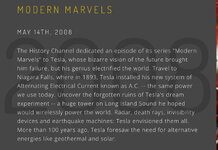 IMG_0031.jpeg111.1 KB · Views: 9
IMG_0031.jpeg111.1 KB · Views: 9 -
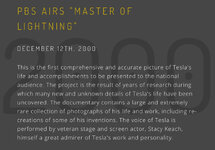 IMG_0030.jpeg102.5 KB · Views: 9
IMG_0030.jpeg102.5 KB · Views: 9 -
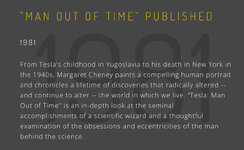 IMG_0029.jpeg81.8 KB · Views: 10
IMG_0029.jpeg81.8 KB · Views: 10 -
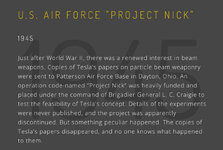 IMG_0028.jpeg100.6 KB · Views: 10
IMG_0028.jpeg100.6 KB · Views: 10 -
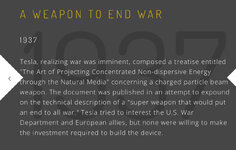 IMG_0027.jpeg232.8 KB · Views: 9
IMG_0027.jpeg232.8 KB · Views: 9 -
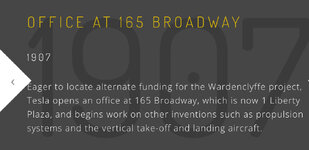 IMG_0025.jpeg149.6 KB · Views: 7
IMG_0025.jpeg149.6 KB · Views: 7 -
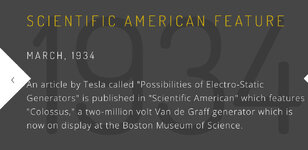 IMG_0026.jpeg147.4 KB · Views: 8
IMG_0026.jpeg147.4 KB · Views: 8 -
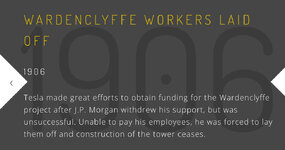 IMG_0024.jpeg61.2 KB · Views: 7
IMG_0024.jpeg61.2 KB · Views: 7 -
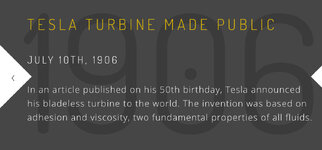 IMG_0023.jpeg139.2 KB · Views: 7
IMG_0023.jpeg139.2 KB · Views: 7 -
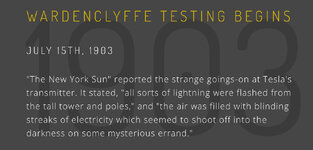 IMG_0022.jpeg163.6 KB · Views: 9
IMG_0022.jpeg163.6 KB · Views: 9
Both AC and DC have their place. DC has a tendancy to heat the wires it runs on. AC doesn't heat wiring as quickly and when at high voltage is less dangerous with shock than DC. There's definitely definitive reasons to use both.Pretty sure on first and last. Not sure on the others.
It must have been interesting back in the day, those two arguing over DC and AC. Who won? I know my CPU runs on DC, but power from the wall is AC, and the switch mode power supply that inside of the PC runs at a frequency that Tesla probably could only dream about. Needless to say, we are far removed from the technology that those men put forth and promoted.
How do you figure that, the heat difference? Same power, if at same voltage, is same i squared r loss. Only once you get past a radius of about a third of an inch, the ac conductor will have higher r loss due to skin depth.Both AC and DC have their place. DC has a tendancy to heat the wires it runs on. AC doesn't heat wiring as quickly and when at high voltage is less dangerous with shock than DC. There's definitely definitive reasons to use both.
DC power only travels in one direction and when it’s used under high effort and cannot flow quickly it’ll heat its conductors extremely fast. AC constantly switches polarity so while that could also generate heat, it’s not as susceptible to build heat as quickly.How do you figure that, the heat difference? Same power, if at same voltage, is same i squared r loss. Only once you get past a radius of about a third of an inch, the ac conductor will have higher r loss due to skin depth.
We deal with this in locomotives. DC locomotives will burn the contacts right off the traction motor in high effort situations. They have what that refer to as short time ratings where we have to drop below a certain power threshold after so many minutes before going back above that rating.
AC locomotives have no such limitation.
Tesla was, in my book, simultaneously a genius and a kook. He really was truly an outside the box thinker with some brilliant innovations to his name, some of which were objectively better than anything else available and some of which were so far ahead of current technology that they seem fantastical at the time but later were shown to be correct/viable.
At the same time, he also fell in love with a pigeon...
Overall, though, I think history, especially recent history, has been much kinder to him than his contemporaries were. Let's face it-no matter how brilliant he was, he was an oddball who was likely easy to poke fun of back in the day. I would never doubt his brilliance, but at the same time I think recent history may have over-corrected some of his legacy. Still, though, it's hard to discount his contribution to modern technology, and again some of which wasn't realized until well after his passing.
It's a shame that his name now seems most closely associated with a company, and more specifically an individual(an individual who was not part of the starting of the company, but went to court to be able to be listed as a founder ) who really has more in common with the worst of Thomas Edison and Henry Ford put together....
) who really has more in common with the worst of Thomas Edison and Henry Ford put together....
At the same time, he also fell in love with a pigeon...
Overall, though, I think history, especially recent history, has been much kinder to him than his contemporaries were. Let's face it-no matter how brilliant he was, he was an oddball who was likely easy to poke fun of back in the day. I would never doubt his brilliance, but at the same time I think recent history may have over-corrected some of his legacy. Still, though, it's hard to discount his contribution to modern technology, and again some of which wasn't realized until well after his passing.
It's a shame that his name now seems most closely associated with a company, and more specifically an individual(an individual who was not part of the starting of the company, but went to court to be able to be listed as a founder
A major alternative of alternating current electricity is that the voltage could be stepped up and down through passive transformers. Changing voltage on DC required motor generators, much less efficient.
The ability to transform voltages made it possible to send electricity in major doses across long distances. And to interconnect generation sources, to improve grid reliability.
You might say, Tesla "Transformed" the electric industry.
The ability to transform voltages made it possible to send electricity in major doses across long distances. And to interconnect generation sources, to improve grid reliability.
You might say, Tesla "Transformed" the electric industry.
Similar threads
- Replies
- 36
- Views
- 2K
- Replies
- 21
- Views
- 678
- Replies
- 50
- Views
- 2K
